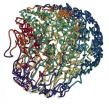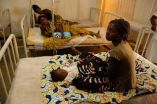(Press-News.org) In captivity, grey parrots are often kept in social isolation, which can have detrimental effects on their health and wellbeing. So far there have not been any studies on the effects of long term social isolation from conspecifics on cellular aging. Telomeres shorten with each cell division, and once a critical length is reached, cells are unable to divide further (a stage known as 'replicative senescence'). Although cellular senescence is a useful mechanism to eliminate worn-out cells, it appears to contribute to aging and mortality. Several studies suggest that telomere shortening is accelerated by stress, but until now, no studies have examined the effects of social isolation on telomere shortening.
Using molecular genetics to assess exposure to stress
To test whether social isolation accelerates telomere shortening, Denise Aydinonat, a doctorate student at the Vetmeduni Vienna, conducted a study using DNA samples that she collected from African grey parrots during routine check-ups. African greys are highly social birds, but they are often reared and kept in isolation from other parrots (even though such conditions are illegal in Austria). She and her collaborators compared the telomere lengths of single birds versus pair-housed individuals with a broad range of ages (from 1 to 45 years). Not surprisingly, the telomere lengths of older birds were shorter compared to younger birds, regardless of their housing. However, the important finding of the study was that single-housed birds had shorter telomeres than pair-housed individuals of the same age group.
Reading signs of stress by erosion of DNA
"Studies on humans suggest that people who have experienced high levels of social stress and deprivation have shorter telomeres," says Dustin Penn from the Konrad Lorenz Institute of Ethology at the Vetmeduni Vienna. "But this study is the first to examine the effects of social isolation on telomere length in any species." Penn and his team previously conducted experiments on mice, which were the first to show that exposure to crowding stress causes telomere shortening. He points out that this new finding suggests that both extremes of social conditions affect telomere attrition. However, he also cautions "further 'longitudinal' studies, in which changes in telomeres of the same individuals over time, are needed to investigate the consequences of stress on telomere shortening and the subsequent effects on health and longevity."
Co-author, Franz Schwarzenberger from the Department of Biomedical Sciences at the Vetmeduni Vienna, points out that their results are exciting because they suggest, "telomere length may be useful as a 'biomarker' that enables to assess an individual's exposure to chronic social stress."
INFORMATION:
The article "Social isolation shortens telomeres in African Grey Parrots (Psittacus erithacus erithacus)" by Aydinonat, D., Penn, D.J.*, Smith, S., Moodley, Y. Hoelzl, F., Knauer, F. & Schwarzenberger, F. was published online on 4 April 2014 in the open access journal PLOS ONE. http://dx.plos.org/10.1371/journal.pone.0093839
About the University of Veterinary Medicine, Vienna
The University of Veterinary Medicine, Vienna is the only academic and research institution in Austria that focuses on the veterinary sciences. About 1,200 employees and 2,300 students work on the campus in the north of Vienna which also houses five university clinics and various research sites. Outside of Vienna the university operates Teaching and Research Farms. http://www.vetmeduni.ac.at
Scientific Contact:
Dustin Penn, PhD
Konrad Lorenz Institute of Ethology
University of Veterinary Medicine Vienna (Vetmeduni Vienna)
T +43 1 4890915-823
dustin.penn@vetmeduni.ac.at
Released by:
Susanna Kautschitsch
Science Communication / Public Relations
University of Veterinary Medicine Vienna (Vetmeduni Vienna)
T +43 1 25077-1153
susanna.kautschitsch@vetmeduni.ac.at
Loneliness impacts DNA repair
The long and the short of telomeres
2014-04-05
ELSE PRESS RELEASES FROM THIS DATE:
Major genetic study links liver disease gene to bladder cancer
2014-04-04
A University of Colorado Cancer Center study published today in Journal of the National Cancer Institute (with related research being presented this weekend at the American Association for Cancer Research Annual Conference 2014) details the discovery of a new genetic driver of bladder cancer: silencing of the gene AGL.
"We tend to think of cancer resulting from mutations that let genes make things they shouldn't or turn on when they should be quiet. But cancer can also result from loss of gene function. Some genes suppress cancer. When you turn off these suppressors, ...
Scientists generate 3D structure for the malaria parasite genome
2014-04-04
RIVERSIDE, Calif. — A research team led by a cell biologist at the University of California, Riverside has generated a 3D model of the human malaria parasite genome at three different stages in the parasite's life cycle — the first time such 3D architecture has been generated during the progression of the life cycle of a parasite.
The parasite that causes malaria in humans is Plasmodium falciparum. The female Anopheles mosquito transmits P. falciparum from an infected human to healthy individuals, spreading malaria in the process. According to the World Health Organization, ...
Analysis finds less research attention given to diseases of the poor
2014-04-04
Death is not distributed equally around the world. In high-income countries, people typically die in old age of chronic diseases such as cancer or cardiovascular problems. In low-income countries, death comes primarily from infectious and perinatal diseases, and strikes at a young age.
But despite massive international efforts to improve global health, a new analysis of nearly 4 million scientific articles finds that research is disproportionately focused on diseases that primarily afflict wealthy countries. Correspondingly, less research attention is given to diseases ...
Nowhere to hide: Kids, once protected, now influenced by tobacco marketing
2014-04-04
(Lebanon, NH, 04/04/14) — More than 15 years ago, many states and tobacco manufacturers established restrictions to prevent youth exposure to the marketing of nicotine products. This follows regulations imposed 50 years ago that banned cigarette ads from TV. Despite these continued efforts, a new study by Dartmouth researchers reveals that not only are young people exposed to tobacco marketing, they are influenced by it. According to a study published in the Journal of Adolescent Health, exposure to "direct marketing" is associated with increased use of tobacco.
"For ...
Does a junk food diet make you lazy? UCLA psychology study offers answer
2014-04-04
A new UCLA psychology study provides evidence that being overweight makes people tired and sedentary — not the other way around.
Life scientists led by UCLA's Aaron Blaisdell placed 32 female rats on one of two diets for six months. The first, a standard rat's diet, consisted of relatively unprocessed foods like ground corn and fish meal. The ingredients in the second were highly processed, of lower quality and included substantially more sugar — a proxy for a junk food diet.
After just three months, the researchers observed a significant difference in the amount ...
Higher social class linked to fewer bone fractures among non-white women
2014-04-04
If you are a middle-aged African-American or Asian woman, your social class may play a significant role in how likely you are to suffer bone fractures, a UCLA-led study suggests.
The study, published in the current issue of Osteoporosis International, is unique in that it followed Asian, African-American and white women for a period of nine years during mid-life; most previous studies on socioeconomic status and osteoporosis risk had focused solely on older white women and often had not collected information on fractures over time.
The new findings help shed ...
EAGeR medical trial: Low-dose aspirin won't prevent pregnancy loss
2014-04-04
BUFFALO, N.Y. – The Effects of Aspirin in Gestation and Reproduction (EAGeR) medical trial has found that, in general, low-dose aspirin is not beneficial for future pregnancy outcomes in women with prior pregnancy loss.
However, in women with one pregnancy loss within the previous 12 months, there did appear to be a benefit.
Jean Wactawski-Wende, PhD, professor in the Department of Epidemiology and Environmental Health in the School of Public Health and Health Professions at the University at Buffalo, is a principal investigator of the Buffalo EAGeR trial and co-author ...
In mice, obese dads produce heavier daughters with epigenetically altered breast tissue
2014-04-04
SAN DIEGO — Obese male mice and normal weight female mice produce female pups that are overweight at birth and in childhood, and have increased number of "terminal end buds" in their breast tissue — the site where cancer often develops in rodents.
The findings, presented by a Georgetown Lombardi Comprehensive Cancer Center researcher at the AACR Annual Meeting 2014, come from one of the first animal studies to examine the impact of paternal obesity on future generations' cancer risk.
In addition, the researchers say they've found evidence that obesity could change the ...
Bacterial gut biome may guide colon cancer progression
2014-04-04
PHILADELPHIA—(April 4, 2014)— Colorectal cancer develops in what is probably the most complex environment in the human body, a place where human cells cohabitate with a colony of approximately 10 trillion bacteria, most of which are unknown. At the 2014 American Association for Cancer Research Annual Meeting in San Diego, researchers from The Wistar Institute will present findings that suggest the colon "microbiome" of gut bacteria can change the tumor microenvironment in a way that promotes the growth and spread of tumors.
Their results suggest that bacterial virulence ...
A new species of horseshoe worm discovered in Japan after a 62-year gap
2014-04-04
The horseshoe worm is a worm-like marine invertebrate inhabiting both hard and soft substrates such as rock, bivalve shells, and sandy bottom. The name "horseshoe" refers to the U-shaped crown of tentacles which is called "lophophore." Horseshoe worms comprise a small phylum Phoronida, which contains only ten species decorating the bottom of the oceans.
The new species Phoronis emigi, the eleventh member of the group described in the open access journal ZooKeys, comes after a long 62 year gap of new discoveries in the phylum. It is unique in the number and arrangement ...
LAST 30 PRESS RELEASES:
New tool reveals the secrets of HIV-infected cells
HMH scientists calculate breathing-brain wave rhythms in deepest sleep
Electron microscopy shows ‘mouse bite’ defects in semiconductors
Ochsner Children's CEO joins Make-A-Wish Board
Research spotlight: Exploring the neural basis of visual imagination
Wildlife imaging shows that AI models aren’t as smart as we think
Prolonged drought linked to instability in key nitrogen-cycling microbes in Connecticut salt marsh
Self-cleaning fuel cells? Researchers reveal steam-powered fix for ‘sulfur poisoning’
Bacteria found in mouth and gut may help protect against severe peanut allergic reactions
Ultra-processed foods in preschool years associated with behavioural difficulties in childhood
A fanged frog long thought to be one species is revealing itself to be several
Weill Cornell Medicine selected for Prostate Cancer Foundation Challenge Award
Largest high-precision 3D facial database built in China, enabling more lifelike digital humans
SwRI upgrades facilities to expand subsurface safety valve testing to new application
Iron deficiency blocks the growth of young pancreatic cells
Selective forest thinning in the eastern Cascades supports both snowpack and wildfire resilience
A sea of light: HETDEX astronomers reveal hidden structures in the young universe
Some young gamers may be at higher risk of mental health problems, but family and school support can help
Reduce rust by dumping your wok twice, and other kitchen tips
High-fat diet accelerates breast cancer tumor growth and invasion
Leveraging AI models, neuroscientists parse canary songs to better understand human speech
Ultraprocessed food consumption and behavioral outcomes in Canadian children
The ISSCR honors Dr. Kyle M. Loh with the 2026 Early Career Impact Award for Transformative Advances in Stem Cell Biology
The ISSCR honors Alexander Meissner with the 2026 ISSCR Momentum Award for exceptional work in developmental and stem cell epigenetics
The ISSCR honors stem cell COREdinates and CorEUstem with the 2026 ISSCR Public Service Award
Minimally invasive procedure effectively treats small kidney cancers
SwRI earns CMMC Level 2 cybersecurity certification
Doctors and nurses believe their own substance use affects patients
Life forms can planet hop on asteroid debris – and survive
Sylvia Hurtado voted AERA President-Elect; key members elected to AERA Council
[Press-News.org] Loneliness impacts DNA repairThe long and the short of telomeres




